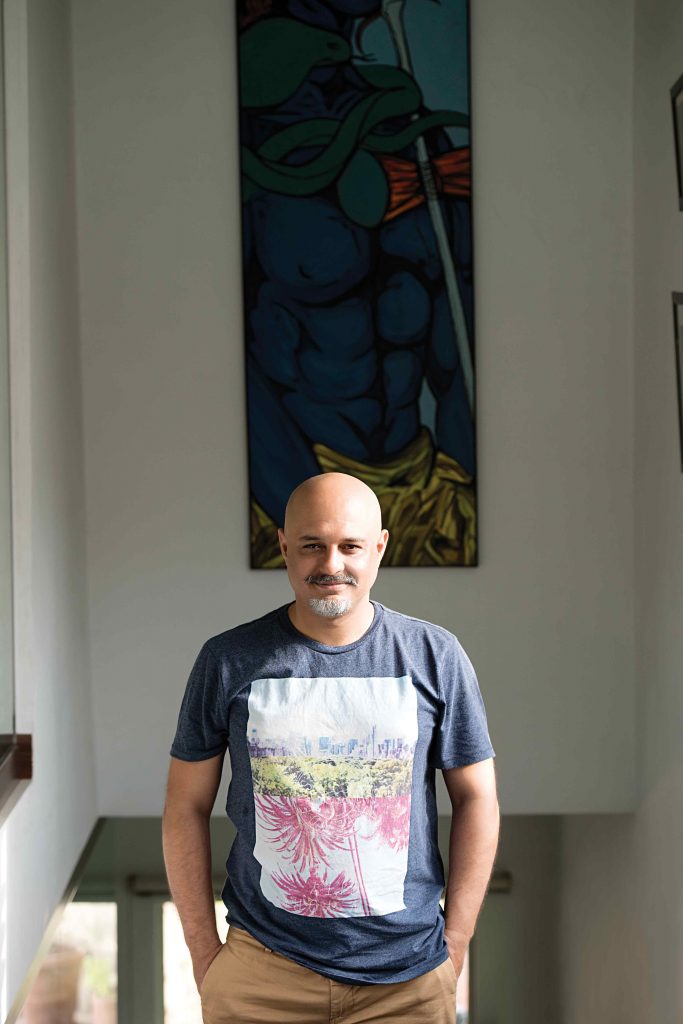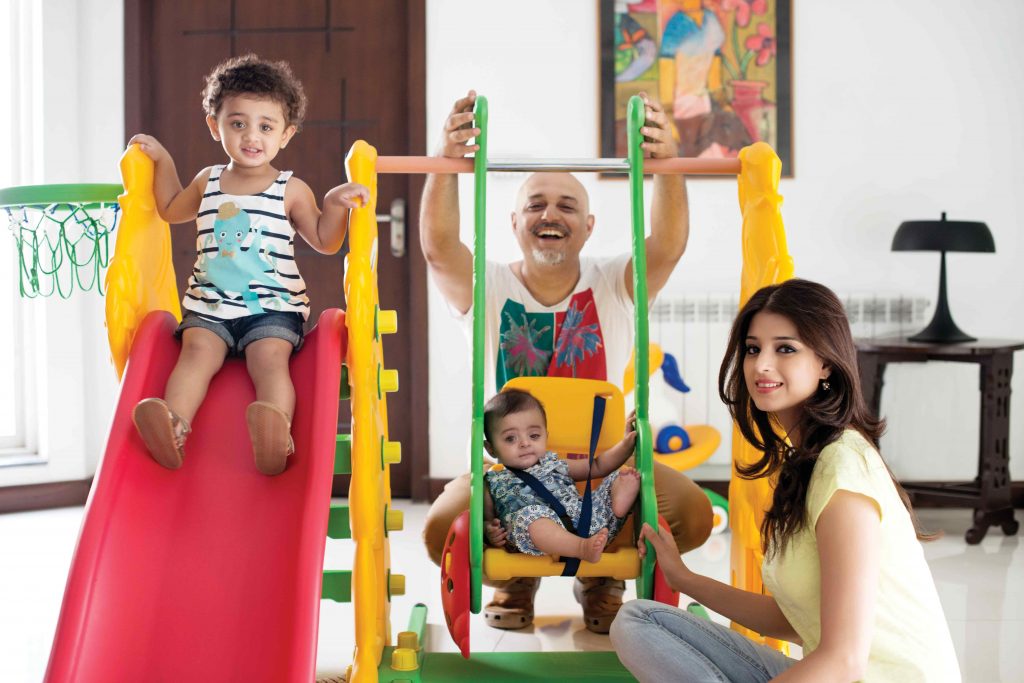
Ali Azmat may be eccentric but he possesses undeniable star quality. His powerful vocals were there when he sported long, rockstar locks, and they haven’t gone MIA even after the hair has been shaved off! He was the lead singer of one of Pakistan’s most iconic bands Junoon and today, at 44, he continues to pursue his passion – music. Whether it was Junoon’s signature tabla-guitar-drum sound or Azmat’s power-packed performances, the lyrics of Sayonnee, Jazba Junoon and Pappu Yaar are safely inscribed in our minds.
After the sad demise of Junoon in 2005, fans were left shattered. Azmat then decided to go solo and with his new sound, he continues to keep his listeners captivated. He brought forth songs like Bum Phatta and Babu Bhai which portrayed his “crazy and energetic” persona, and after 26 years in the business, this veteran singer-songwriter’s fan base is only increasing.
With his recent performance in Waar along with several others over the years, Azmat also proved his acting prowess. He now confesses that acting is not his cup of tea so we won’t be seeing him on the big screen any time soon for sure! And Pakistan Idol, he’s staying away from as well! With a perpetual drive to innovate, Pakistan’s favourite rockstar catches up with OK! about his journey to stardom and the loves of his life – his two adorable daughters.
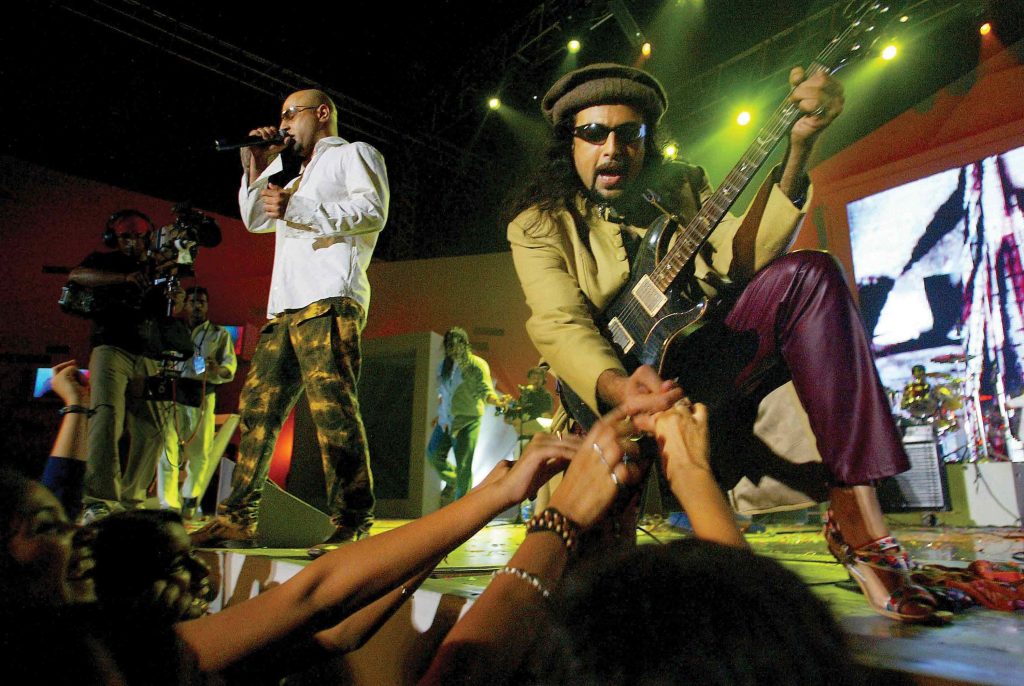
Tell us about the early days of your career pre Junoon.
Ali Azmat: I started back in ‘88 with a band called Jupiter. It was more of a commercial band that played music in a bar but we didn’t have any bars [Laughs] so we played at weddings, birthday parties, school events, fun fairs, etc. I would generally sing English songs. I was 18 and I needed something to do. It was fun and a good way of learning what music is all about, how to play the guitar, what different melodies are, what guitar chords are, etc. I did that for a couple of years then moved to Australia for college. I studied business administration, then came back, started Junoon and was with them for 14 to 15 years.
Why didn’t you pursue a career in business administration?
AA: Well, I did work for a bank for about five days [Laughs] but I couldn’t do it – just sitting around an office wasn’t for me. I’d be looking at my watch the whole day and telling myself I needed to get out of there. Then, five days later, I just got out. I was like I’d rather be poor than make PKR 15,000 on this job. And when I played with the band, I could make PKR 30,000 which, at that point in time, was unprecedented. I got a motorcycle when I was 18 and six months later, I had my own car.
Were your parents supportive of your career choice?
AA: My parents were very supportive but everyone else, like my dada and dadi, weren’t. They were like, “What’s he doing, parh likh kar maraasi wala kaam kara hai, hum inko nai jaantey.” There was a lot of “tang nazri” from the extended family and they always had their reservations. But my parents were supportive and didn’t want me to do something that didn’t make me happy. They were like, “Do what you want,” so I got my own place at the age of 18 and didn’t go back until 2008 when my parents started getting old and I had to take care of them. So since then, I’ve been living in Lahore with them.
Junoon is remembered as one of the best rock bands of the country. Why don’t we have bands like Junoon and Vital Signs anymore – what’s lacking in our music industry?
AA: It was probably because we were the first ones in our categories. Vital Signs didn’t really stick around that long – it was probably just five years. They were always breaking up and patching up, breaking up and patching up. It was very rocky. Junoon, on the other hand, stuck around. Our first concert was in 1991 and we played together and toured the world till 2005. It was a very stable band compared to others and that’s what counts the most. Taking out albums, creating music and performing together builds your repertoire. We had 30 to 40 hits, unlike other bands who only have four or five hits to select from when performing at a concert. Our concerts were memorable – we gave our 100 per cent. It was all blood, sweat and tears. And nobody else did it the way we did. We had the power of good musicians and good songs combined with great performances. Our audience grew from five to 500 to 5,000 to 50,000. It was a slow and painful process but we were young and in no hurry. We had no money and had nothing else to do so we stuck around. Most musicians these days are like, “I have a business degree, I’ll join my dad’s business or I’ll move to Canada,” and they constantly go through this dilemma.
Is it easier for musicians today as compared to when you started?
AA: It’s a totally different phenomenon now. Today, people are like, “Oh wow he’s roaming around in a land cruiser,” or “Ali Zafar has a BMW,” or “It seems like a good business and we should do it too.” But this is now, after so many years. Artists before us, like Mehdi Hassan, Nusrat Fateh Ali Khan and Ghulam Ali, barely had money. This generation is doing better. Rohail Hyatt is a rich guy, Rahat Fateh Ali is a multi-millionaire/billionaire, Atif Aslam is rich, etc. These days, it’s actually a little fashionable to be a musician.
You’ve never been affected by such issues?
AA: You enjoy it at the beginning and thankfully, it happened very early in life for me so I got over it fast. The bottom line is, do the concert and make money. Everything else is bulls***. I can travel around in an expensive car but I also have a Suzuki parked downstairs and don’t care. If you want to make it, you can’t get stuck in these things because then you will only be serving them and not your creative side. I’ve survived for 26 years and I can’t say the same for many others in this country. If you make a big deal out of small things, like travelling only in limousines and no other car, then you’re focusing on the wrong things. I focus on my music and my act. People buy tickets again and again, even after 26 years, so I might be doing something right and it’s not the limousine! [Laughs] Although, yes, I loved going around the world partying back in the day but it shouldn’t become the focus. The actual work is only two hours but the bulls*** around it is 15 hours. You need to retain your energy and focus on those two hours. It’s a delicate business and most people don’t make it because they get stuck in these things.
What led to the demise of Junoon? A lot of people say it’s because Salman Ahmad went behind the mic. Is that true?AA: That was one of the reasons. Most people couldn’t deal with it and they were like, “Please stop him from singing.” Even if I tried, he still thought he was singing really well. And I was like, “Well if you are so cool, then like do it on your own, I don’t want to be on stage with you.” Also musically, we were growing apart. I would write a song, and he’d be like, “It’s great but I don’t know if it’s for Junoon.” So I was like so what is “for Junoon”? So slowly, we drifted apart and he moved to America and that was the last nail in the coffin. He was like, “Come to America if you want to make music,” and I was like, “I’d rather stay here and make music with a band that I can actually jam with.” But it wasn’t a hostile break-up at all. The last concert we played was in Los Angeles in 2005 in front of 35,000 people. It was good to say goodbye on good terms.
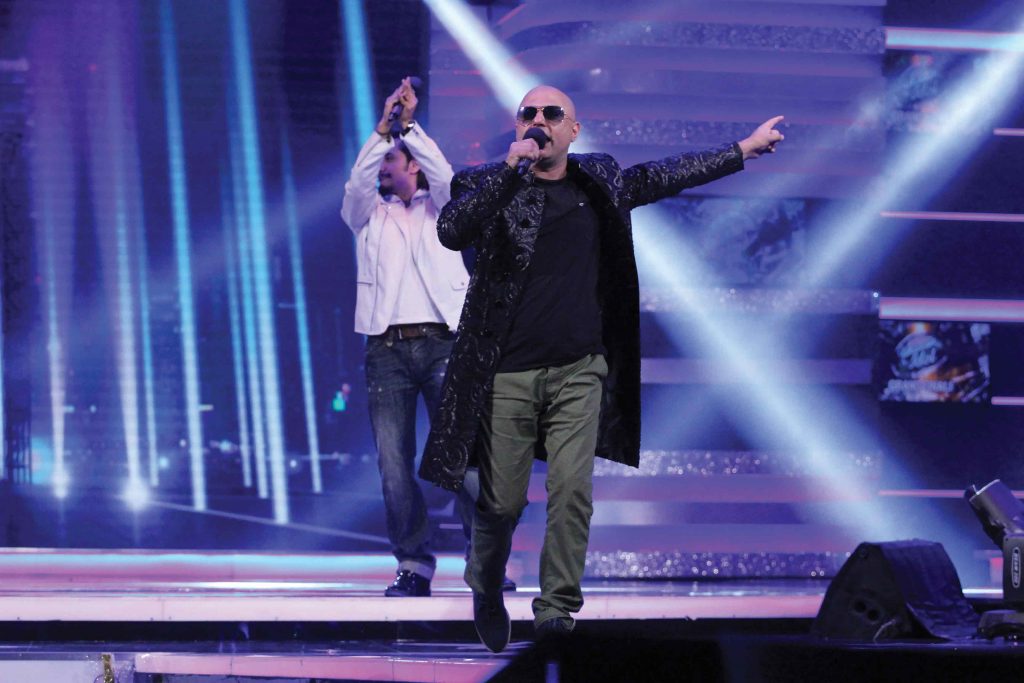
Are u in touch with Salman Ahmad and Brian O’Connell? Are you guys still friends?
AA: We do stay in touch on and off, but friends, not so much. I mean Brian and I are, we talk regularly. But I spoke to Salman after ten years.
Salman Ahmad has said in the past that Junoon is getting back for a single very soon. Is that true?
AA: That’s all bulls*** marketing. It’s like throw a drowning man a stick and he hangs on to it. And talking to someone or meeting an old friend after years doesn’t mean you’ve committed to something. If I’m like, “What’s up, kya hora hai, bachey theek hein,” that doesn’t mean I agreed to some reunion. [Laughs] I can have a chat with you for five hours, and it won’t mean anything; it definitely doesn’t mean we are getting into some business relationship.
Do you feel ego issues amongst band members can make or break bands?
AA: That’s exactly what it is and I’ve experienced it first hand. We had a guitar player who thought nothing could work without him. So he was like, “I’ll take the money for everything since I’m doing everything.” So yeah, ego plays a big role I mean, look at Vital Signs and Fuzon. A singer for example, gets appreciation, gets hooked up with some girls, gets a new Corolla and thinks he’s the s***. But you’re performing in front of thousands of people, so you can’t really blame them. They love and adore you, so it’s the adulation.
Is there any band you consider competition or feel has potential?
AA: If they had potential, where are they? [Laughs]
What about all the new guys like Atif Aslam and Ali Zafar?
AA: Not really. I mean Junoon became Junoon because we wrote our own music. We had a particular sound. And we built our audience base over 15 to 20 years, not overnight. Then there are people like Atif Aslam who sing Indian songs which are essentially written and produced by other people. Ali Zafar is a similar case. It’s not a signature sound.
The underground scene is pretty massive in Pakistan. What do you think of all these bands?
AA: The good thing is they want to play music and anyone who loves music should be playing it. I like a band called Poor Rich Boy and their song Alice. After I heard them sing, I was like, “Wow, they have their own signature sound.” This band is definitely one to look out for. And anyone can be a hit when the song is something new, but you need to keep throwing music at the audience so they can get used to you. That’s how you develop a cult following. Aloo Anday aye thay – where’d they go? You need to keep making music.
We have very limited female musicians. Why do think this is?
AA: Zoe Viccaji writes her own songs. I don’t really like them but she’s a great singer. Hadiqa Kiyani is a great singer but hasn’t written any great songs. Reshma’s songs are remembered today too. The thing is, you can have a great voice, wear the best clothes but you can’t become an artist until you write your own songs. It’s not about being a female artist because there are many – Fareeha Pervez, Meesha Shafi, Komal Rizvi – it boils down to writing your own songs. There’s QB [Qurat-ul-Ain Balouch] as well. She’s a great singer and she’s sung a couple of songs for dramas. But she can’t write her own songs so she’ll fade away. And this applies to any artist who doesn’t write new songs. If I don’t, I’ll fade away too. Ali Haider is still doing Purani Jeans. People box him there and then and say he can’t write any other songs. People will get put off eventually. You need to give listeners something new every time whether it’s Bum Phatta or Babu Bhai – this is what we’re going through right now. You need to be in touch with your surroundings. Queen Victoria once that, “Beware of the artist, they are the most dangerous.” This is because they mix with all classes and everyone appreciates them.
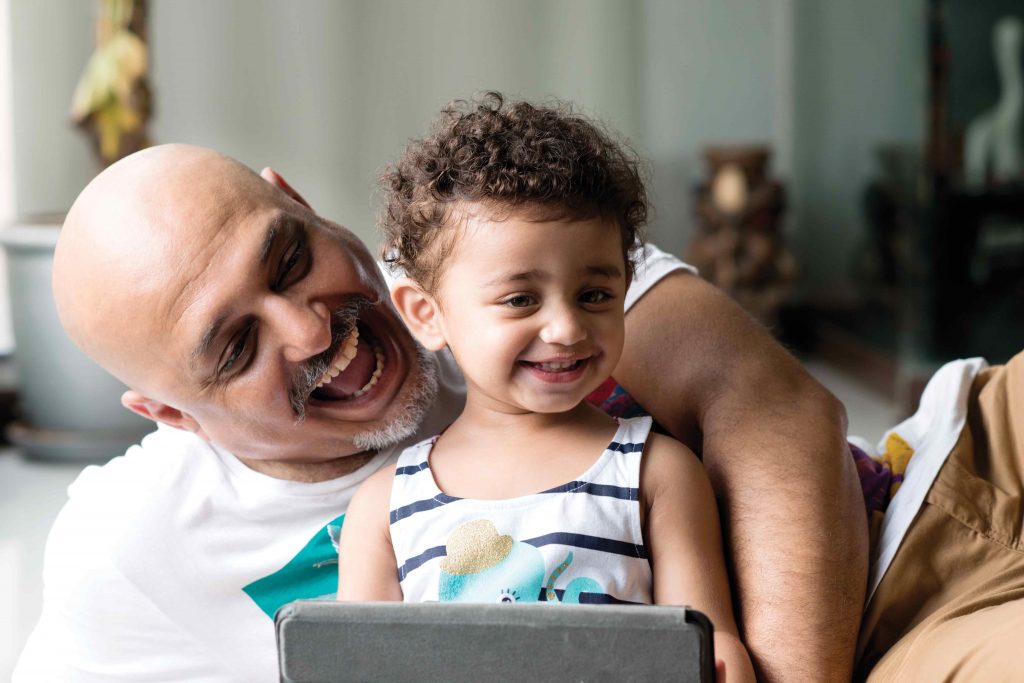
You’ve always kept your family away from the limelight, why?
AA: I feel that marriage is for the family and not for the world. Plus I wasn’t going to go on Shaista Wahidi’s morning show and do a valima there. [Laughs] I wouldn’t want to expose my kids unnecessarily. They have a good life at home. After 1 pm, Ella wants to go swimming so I have to hold her in the pool while she pretends to swim by flapping her arms. I feed my daughters Ella and Mia and take them on trips – that’s their life. I once had to fly out of the city so I woke up at 7 am, played with my babies, had naashta with them and spent some quality time. I have to figure out solutions to their problems. It’s sort of my recluse. So I don’t want to disturb it. They don’t know anything about what I do. When my daughter sees me on TV, she’s like, “Baba, baba on TV!” So she understands it a little but she’s only 20 months and it’s always better to keep the family separate.
Who are your music icons?
AA: One band that has stayed with me all this while is Queen and it’s because of their music writing capabilities. They were classically trained yet they wrote all kinds of music – opera, rock, disco, punk, etc. They epitomise what musicians should be like. They kept coming up with new sounds. Freddie Murphy was someone who could sing just about anything. Recently, it’s been Dave Matthews Band because of their music and Pink Floyd, as well.
What do you do when you aren’t performing or making music?
AA: I am at home, spending time with my babies. I wake up with them, sleep with them and change their diapers. And if I get time, I get on my motorcycle and go up to the mountains.
No one ever expected Ali Azmat to settle down – how did it finally happen?
AA: At 41, my family forced me to get married. It wasn’t arranged or anything, I mean I knew the girl but my parents were like just get married now. I had my first baby at 42, and now I’m 44 and have two girls. I’m hoping to have a few more before I’m 50. [Laughs]
“I just love babies. I love my kids. I enjoy being with them. I can spend four to five hours just lying around in bed with them and not want to do anything else.”
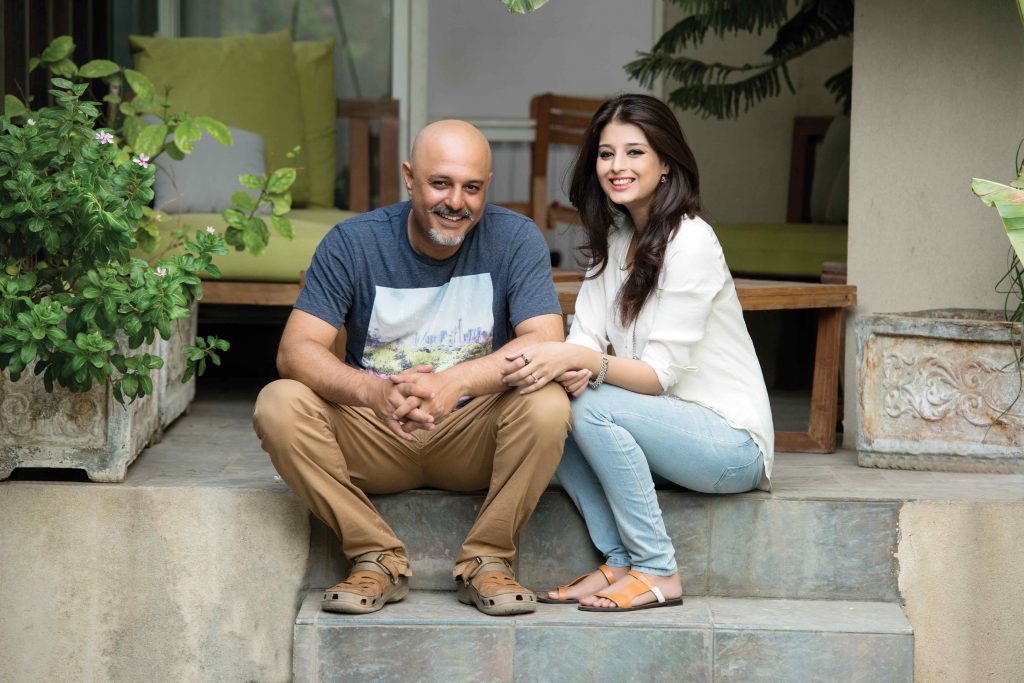
You’ve been acting on the side as well. Do you enjoy it just as much?
AA: It’s forced labour and I don’t like it at all. You need a lot of patience. I did Pakistan Idol recently and I will never do it again. You are just sitting on a chair for 20 hours listening to songs. I had signed up for another project recently, but I realised I just wasted those few days because nothing really got done. I don’t the have patience for acting at all.
RAPID FIRE
Your favourite getaway?
AA: Mountains
Three musicians you’ve loved working with
AA: Omran Shafique, Gumby and Kamran Zafar
Solo artist or band?
AA: Solo
Favourite place where you performed?
AA: I played a concert in Dhaka recently. It was a great crowd – Bengalis are very musical, hospitable and they come in very large numbers
Favourite past-time?
AA: Picking up my guitar and just sitting with the kids. Meanwhile one is trying to mess with my tuning. Every five minutes, she will mess with it. The younger one cries every time I play something she doesn’t like. I enjoy that
Salman Ahmad?
AA: Old colleague and great songwriter – possibly one of the best songwriters
Ali Azmat, Ali Zafar or Atif Aslam?
AA: Ali Azmat, of course
![]()
FEATURE: EIMAN MASROOR
PHOTOGRAPHS: FAISAL FAROOQUI@DRAGONFLY, AFP, GETTY, KASHIF RAFIQ UDDIN
































